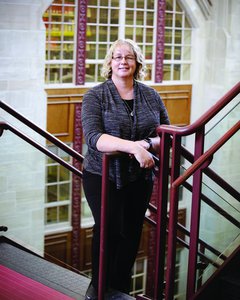Beth Heldebrandt is diligent about her healthcare. She schedules her mammogram to coincide with her birthday— an easy reminder to get it done annually.
“Over the years, my mom and sister have had some breast cancer scares that turned out to be cysts. I think that made me more cognizant of potential breast issues,” Beth said. Their histories, coupled with a family history of two aunts and two cousins having had breast cancer, have kept Beth on high alert.
Following her screening mammogram in September, Beth received a letter stating that she had dense breast tissue but that the mammogram was negative for any tumors. Beth breathed a sigh of relief.
Yet, a week later, she received a call from her primary care physician, Marlene Kremer, MD, who explained that Sarah Bush Lincoln offers MRIs to women with warning signs of breast cancer. Screening MRIs now allow radiologists to see more clearly through dense breast tissue. While breast MRI is not a new technology to the Health Center, it hasn’t been used as a screening tool.
Through an algorithm that combines family history and breast density measurements, the process identifies women who are at a higher risk of developing breast cancer. It is recommended that women with a score of 20 percent or higher speak with their physicians to decide if MRI is appropriate for further evaluation. With Beth’s age, breast density and family history, she fell into the high-risk category.
Beth, who is the director of Public Relations at EIU’s Booth Library, approached the screening exam with some skepticism. “My first thought was whether this test was really necessary, and Dr. Kremer explained why she was recommending it,” Beth said. “My second thought was whether my insurance would cover the expense. I made the appointment because I thought I’d rather be safe than sorry.”
Beth explained that during the MRI, she lay still on her stomach with most of her body outside of the magnetic tube. The technologist gave her ear phones and turned on music Beth wanted to listen to. “The MRI makes a loud thumping noise, but it is painless,” she added.
After the baseline scan was done, contrast dye was injected into Beth’s arm through an IV, so the radiologist could clearly see if there were any abnormalities.
“The nurse called me later to tell me that there were no tumors, but the doctor did find several small cysts that appear to be benign. We’re going to keep an eye on them and I will go back in about six months to make sure nothing has changed,” Beth explained.
She wasn’t too surprised to learn she had cysts, though. “It was always in the back of my mind that I would have cysts because of my mom’s and sister’s histories. I am thankful to know they are there and that we’re going to keep an eye on them. If something changes down the road, we’ll have a better handle on it, and we will be able to intervene sooner rather than later. I just feel like I’m more in control of my health now,” Beth said.
For more information or to make an appointment for a mammogram, call Central Scheduling at 217-258-2588 or 1-800-639-5929.

